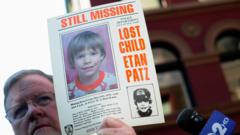The Second Circuit Court of Appeals found errors in jury instructions concerning Hernandez's confessions during the trial, which could significantly impact the case that has left a haunting legacy since Patz's disappearance. Hernandez's legal team seeks clarity on the instructions given during his trial as they prepare for the next steps.
Appeals Court Orders New Trial for Convicted Killer of Etan Patz

Appeals Court Orders New Trial for Convicted Killer of Etan Patz
A New York appeals court has ruled in favor of a new trial for Pedro Hernandez, convicted in the notorious 1979 case of six-year-old Etan Patz's murder.
A New York appeals court has ruled that Pedro Hernandez, who was convicted for the murder of six-year-old Etan Patz in 1979, is entitled to a new trial or immediate release. The decision, made by the Second Circuit Court of Appeals, highlights concerns over jury instructions that were said to have violated federal law and potentially prejudiced Hernandez’s conviction.
The case originated when Etan Patz went missing on his way to a school bus stop in Manhattan, an incident that became a pivotal event in the national dialogue about child safety and missing persons. Hernandez, then operating a convenience store, confessed in 2012 to luring Patz into his basement and subsequently killing him. However, his initial confession came after extensive police questioning without proper legal warnings, raising questions about its voluntariness.
The appeals court identified that the jury had been misinformed on how to treat Hernandez's confessions, especially when jurors sought guidance on disregarding the first confession if deemed involuntary. The courts responded incorrectly by instructing jurors they must not disregard it, a decision the appellate court deemed inconsistent with established legal principles.
Hernandez’s attorney, Harvey Fishbein, expressed satisfaction with the decision, emphasizing the importance of justice reform and urging the Manhattan District Attorney's Office to abandon charges that were based on flawed legal processes. The ruling has re-ignited discussions about the unresolved case of Etan Patz, whose disappearance has left an enduring mark on the city and spurred calls for more effective measures to protect children.


















